- Home
- J. T. Edson
The Floating Outift 36 Page 2
The Floating Outift 36 Read online
Page 2
‘You’ll be all right in a few weeks,’ O’Day promised, when the young man had recovered. Fetching him a cup of coffee from the fire, the dude continued, ‘Now I’m going to help you some more.’
‘How?’ Dixon wanted to know.
‘First you have to help me,’ O’Day countered.
‘If I can,’ Dixon said warily.
‘Tell me where I can find Joey Pinter.’
‘Who’d he—’
‘Friend, friend,’ O’Day interrupted chidingly. ‘Do you know why I’m taking all this time and trouble to help you?’
‘Nope,’ the young outlaw admitted.
‘Because I believe that you’re worth saving and giving a second chance. You’re not like those three. They were bad all through, but you’re not.’
‘Who—Who are you, mister?’
‘My name’s O’Day. I’m Governor Stanton Howard’s Chief Amnesty Inspector.’
‘What’s that?’
‘You’ll probably know that the Governor has promised to end the current wave of lawlessness in the Sovereign State of Texas?’ O’Day asked.
‘I’ve heard tell of it,’ Dixon agreed bitterly.
Most outlaws in the Lone Star State grew bitter, or profane, when speaking of Governor Stanton Howard’s vigorous policies regarding themselves. Unlike the Davis Reconstruction Administration, the present head of Texas’ political affairs was pressing hard to contain the outlaw element’s activities. Brought back to replace the corrupt, inefficient State Police, the Texas Rangers were running the various criminal bands ragged and generally making life unbearable for any man with a price on his head.
‘The Governor is a humane man,’ O’Day went on. ‘He knows that a whole lot of young fellers were pushed into a life of crime through no fault of their own. He doesn’t want them hounding down like the real bad hombres. So he’s offering an amnesty and free pardon to those young men.’
‘What’s that mean?’
‘The men he’s after won’t be outlaws any more. That’s why I’m out here. It’s my duty to find such men, interview them and decide on whether they are deserving of the amnesty.’
‘And you’re figuring on Joey Pinter as one of ’em?’
Dixon might lack intelligence, but he was smart enough to know that the brutal, murderous Joey Pinter would be an unlikely candidate for a pardon. Not even the most humane man in the world would risk his political career by publicly forgiving Joey Pinter’s many crimes.
‘Is that likely?’ O’Day scoffed, reading the other’s thoughts. ‘But I know that you rode with him.’ He waved a hand to silence Dixon’s protest before it could be uttered. ‘Don’t try to shield him, which’s what you planned to do. I’ve read your character and you’re not a liar. If I thought you was, I’d not offer to help you.”
'You’re going to help me?’ Dixon yelped.
‘I am. But I must know where Pinter is, then I can arrange things so that he doesn’t come and interfere with you in your new life.’
‘He won’t do that. He was killed by Ed Caxton up in Hell.’
‘In—?’ queried O’Day.
‘Hell,’ Dixon repeated. ‘It’s a town in the Palo Duro country.’
‘I thought that the Indians still controlled that region,’ O’Day remarked.
‘They sure do. Hell’s smack-dab in the middle of the Kweharehnuh Comanches’ home-range.’
‘And the Indians don’t molest you?’
‘Neither going there, nor coming back,’ Dixon grinned. ‘The mayor sees to that. Right smart feller he is for a dude. He’s got them Antelopes eating out of his hand, thinking he’s a mighty strong medicine man. What I heard, he does the damnedest thing to keep them that way. They say he saws his wife in half.’
‘I’ve heard tell of it being done,’ O’Day admitted, but there was a glow of interest in his eyes which did not match his casual tone. ‘Did you see the mayor do it?’
‘Nope,’ Dixon replied, regretfully. ‘Way I heard it, though, it’s a sight to see. He’s got this cute lil brown-haired woman all dressed in just about the shortest Injun gal’s frock you ever did see—’
‘You say that Pinter was killed there,’ O’Day interrupted. ‘By the law?’
‘Naw. There’s no law in Hell, ’cepting the mayor. It was Ed Caxton who made wolf-bait of Joey. Him’s robbed the Yankee blue belly paymaster.’
‘There’s no sheriff, or town marshal in Hell?’
‘Shucks, no. It’s a town for owlhoots to go to when things get hot. All you have to do is give the mayor ten percent of your loot and you can stop on and have a good time for as long as your money lasts.’
‘How is it that nobody’s heard about Hell?’ O’Day asked.
‘It’s been kept a secret,’ Dixon explained. ‘There’s not many folks go into the Palo Duro and the mayor makes sure only real owlhoots get through to the town?
‘How does he do that?’
‘He’s got scouts up on the high points all ’round. They see somebody coming and light a fire. Ordinary folks see smoke up that ways, they steer well clear of it. Owlhoots, who know, head for it. Then one of the scouts meets you, takes all your guns and shows you the way in?
‘You mean that you fellers let him take all your weapons?’ O’Day demanded.
‘Them as didn’t soon enough wished they had’d,’ Dixon elaborated. ‘If they didn’t, the other scout signals and the Antelopes jumped em so fast they figured the hawgs’d come to feeding?
‘So all I need to do is ride towards the Palo Duro country? O’Day commented, half to himself. ‘Head for the smoke and get guided into Hell. That sounds easy enough.’
‘It sure i—? Dixon agreed, then stared as the dude started to walk away. ‘Hey! Where’re you headed?’
‘To Hell,’ O’Day replied.
‘How’s about me?’ Dixon yelped. ‘I’ve got this busted leg and can’t travel on it?
‘That’s right? O’Day admitted. ‘You’re not wanted any place?’
‘Nope.’
‘And you don’t have a price on your head?’
‘Hell, no!’
‘Then you’re no use to me alive or dead? O’Day said quietly.
Drawing and cocking his Colt, O’Day shot Dixon in the head.
Chapter Two – That Was One Mean Town
‘What do you reckon’s eating at Dusty, Lon?’ Waco asked the Ysabel Kid as they stood clear of the laughing man and girls gathered around the campfire. ‘Something sure as hell is, and has been ever since we got clear of Hell.’
Tall, slim, yet conveying an impression of possessing whipcord, untiring strength, the Kid had hair as black as a raven’s wing and a deeply tanned face with handsome, almost babyishly innocent lines. Except, that is, for its red-hazel eyes. They warned that beneath the exterior lay a wild, reckless spirit. Instead of his usual all black clothing, he wore a low crowned, wide brimmed J. B. Stetson hat of Texas style, fringed buckskin shirt and Levi’s pants tucked into calf high Comanche legging-moccasins. About his middle hung a gunbelt, with a walnut handled Colt 1848 Dragoon revolver butt forward in a low cavalry-twist draw holster on the right and an ivory-hilted James Black bowie knife sheathed at the left.
There was something suggestive of the Indian about the Kid, which was hardly surprising. He had been born in the village of the Pehnane—Wasp, Raider, or Quick Stinger—Comanche band, maternal grandson of chief Long Walker and his French-Creole pairaivo. 1 His mother had died in childbirth and his father, a wild Irish-Kentuckian who had been adopted into the Pehnane, had often been away from the camp attending to the family businesses of mustanging and smuggling along the Rio Grande. So, in the traditional Comanche way, the Kid had been raised by his grandfather. That was no mean start in life. Long Walker was war leader of the Dog Soldier lodge and had been determined that his grandson would be worthy of acceptance into the exclusive brotherhood.
So the Kid had received a thorough schooling in all those matters a successful Dog Soldier must know.
Skill with weapons rated high on the curriculum. He had acquired considerable proficiency with bow and arrows, war lance, tomahawk—and such expertise with a knife that he had earned the man-name Cuchilo. On obtaining the arms of his father’s people, he had become adequate with the old Dragoon and almost unequalled in accurate shooting with a rifle. In the arts of horse-management, trick riding, following tracks and hiding his own sign, locating hidden enemies or staying concealed when sought by keen-eyed hunters, he had graduated with honors.
It had not been an educational system calculated to endow its recipients with an exaggerated belief in the sanctity of human life. Nor had the Kid’s formative years tended to increase his qualities in that field. When old enough, he had accompanied his father. By then Big Sam Ysabel had given up mustanging and was smuggling full time. So the youngster had been thrown into contact with some mighty tough, mean hombres, Texan and Mexican. The former had called him Sam Ysabel’s kid at first, shortening it to the Ysabel Kid as he had come into greater prominence. Translating the name, the Mexicans had said el Cabrito. One thing all had been in agreement upon: kid or old as sin, that Indian-dark, soft-spoken youngster was equal to anybody in tough, salty courage, and deadlier than most.
The War Between the States had seen the Kid and his father employed as legal smugglers, delivering cargoes from Matamoros across the Rio Grande to the Confederate States’ authorities. It had been tough and demanding work, carried out satisfactorily. With peace—or at least an end to open hostilities—the Ysabels had intended to go back to mustanging until more settled times made illegal smuggling profitable. Bushwhack lead had ended their hopes by cutting Big Sam down.
While hunting for his father’s killers, the Kid had come to the turning point of his life. He had met and been helped by Dusty Fog, who was handling an assignment upon which the future peace of the United States had depended. 2 With both their missions concluded successfully, Dusty had offered to employ the Kid on the OD Connected ranch. Not as an ordinary hand, but to carry out scouting and similar duties as a member of the spread’s floating outfit.
The great ranches often employed a floating outfit; half a dozen or so men who travelled the far ranges as a mobile crew, instead of being based at the main house. Ole Devil Hardin’s floating outfit had also frequently found themselves dispatched to help their boss’s friends out of difficulties and dangerous predicaments. In such tasks, the Kid’s Comanche education had been of much use.
There were, the Kid had often mused, many points in common between himself and the youngster whose only name was Waco. And one difference. The Kid’s life had been saved by Indians, Waco’s parents had died by the same cause; although at the hands of the tribe from which he had taken his name. They were alike in that, but for meeting the Rio Hondo gun wizard, they might have now been riding the owlhoot trails with prices on their heads. Although the Kid had avoided it, there had always been the chance that he would run afoul of the law when smuggling. Waco’s fall from grace would probably have been that he had killed too often and without reason.
Raised by a North Texas rancher with a large family, Waco had drifted away from them. As a tough, proddy youngster with a brace of fast guns, he had drawn the attention of Clay Allison. Always on the look-out for such talent, the Washita curly wolf had hired Waco to ride with his wild onion crew. It was not company in which a mild-mannered introvert could have survived, and it had left its mark. The youngster had become sullen, watchful, quick to take offence, because that was a good way to avoid being put upon.
So things had stood that day up in the Texas Panhandle, when Dusty Fog had saved Waco’s life at some danger to his own. From the moment he had been set down, after Dusty had snatched him clear of the stampeding CA herd, 3 Waco had begun his redemption. At Dusty’s request, Allison had let the youngster become a member of Ole Devil’s floating outfit. In the company of men who had treated him like a favorite younger brother and were willing to explain things—which Allison’s crew would never do—he had lost his ready aggression and learned much which would be of use to him in later years.
Most important of all, Waco had learned when to add to his knowledge of how to shoot.
Slightly taller than the Kid, with wider shoulders and a frame that told of developing strength and muscular power, Waco was dressed in expensive cowhand clothing. A white Stetson perched on his blonde head at a jack-deuce angle over his right eye. Around his neck, a tight-rolled and knotted green silk bandana trailed its long ends down over a blue shirt. His Levi’s cuffs hung outside high heeled, fancy stitched boots. Around his waist, a gunbelt of exceptionally fine workmanship supported matched staghorn handled 1860 Army Colts in contoured, tied-down holsters.
Concern showed on his tanned, handsome young face as he addressed the question to his older, more experienced companion.
‘You reckon so?’ countered the Kid.
‘I know so, you slit-eyed Pehnane,’ Waco growled.
‘There’s some’s’d say ole Dusty’d’ve been right pleased to get out of it,’ the Kid drawled. ‘We had a good visit there, we’re coming back alive.’
‘Then what’s—?’
‘That was one mean town, boy, full of lousy folks.’
‘Why sure,’ Waco agreed, wondering if he could ever cease being ‘boy’ to the other members of the floating outfit. Not that he minded them calling him it, for their tones always implied that he would, eventually, grow up into a forty-four caliber man. 4 ‘There wasn’t a feller, nor woman, in it that hadn’t done real bad meanness one time or another.’
‘And we left them there,’ the Kid pointed out. ‘That’s what’s eating at Dusty, boy. He left those folks, men and women, in the Palo Duro, with the Kweharehnuh band all ’round them. Comes time for the bucks to collect their bullets and the folks can’t hand ’em out, all hell’s going to bust loose in Hell.’
‘And serve them right, the stinking bastards. There’s murderers, cheats, thieves and worse, ’n’ nothing else but there. They built the town, now let them pay for it.’
‘Dusty don’t see it that way, boy.’
‘What we heard and saw of ’em,’ Waco protested, ‘they can take care of themselves.’
‘Against things they know about, maybe,’ drawled the Kid. ‘Only they’re most all of them dudes. They don’t know sic ’em about Injuns and a whole heap less about riled-up Antelope Comanches toting repeating rifles—’
‘Which they’ve give to ’em,’ the blond pointed out.
‘I’m not gainsaying it,’ the Kid admitted. ‘And when they handed those repeaters over, they made a promise. When it’s not kept, which it won’t be, there’ll be a whole slew of riled up bucks wanting to know why. Them’s’re killed in the fighting’ll be the lucky ones. And that goes double for their women-folk.’
‘What’ll Dusty do?’ Waco inquired, having no need to be further enlightened upon the Comanches’ treatment of white female prisoners.
‘Likely he’ll tell us when he decides,’ the Kid replied. ‘What do you reckon he’ll do?’
‘Go back to Hell and try to prize ’em loose,’ Waco guessed. ‘Just’s soon’s we’ve delivered the money in the wagon and seen the gals safe.’
‘Talking about the gals,’ the Kid said quietly, glancing at the group about the fire. ‘How do you reckon they’ll take it when they learn who we are and that they’re not going to get any place close to as much of the money as they’ve been counting on?’
‘I’d say that all depends on how Emma takes it,’ Waco guessed. ‘The rest’ll go along with her. Happen they don’t cotton to the notion, we can count on Belle to back our play. Anyways, once they learn we’re not owlhoots, I reckon Hubert and the gals’ll take what Dusty offers them. It’ll be a fair offer.’
‘Only not as much as they figured on getting,’ the Kid reminded him.
‘Things being how they are,’ Waco replied. ‘I’m betting they’ll take it.’
Although the Kid would not have stated so audibly, he
felt inclined to agree with his young amigo.
Despite what Dipper Dixon had told Break O’Day, the town of Hell had not remained a complete secret. Jules Murat, captain of Texas Rangers, had learned enough to make him suspect its existence. On being informed, the Governor had been faced with a problem. While determined to stamp out lawlessness, and wishing to destroy a safe haven for badly wanted men, Stanton Howard had no desire to provoke an Indian war. Any attempts at the former, unless carefully handled, could easily have resulted in the latter.
Unlike the other bands of the Comanche Nation, the Kweharehnuh had refused to come to terms at the Fort Sorrell peace treaty meeting. 5 Instead, they had retreated to their wild, practically unexplored Palo Duro and Tule country to follow the traditional Nemenuh 6 way of life. All the evidence had pointed to the citizens of Hell having obtained permission to make their homes in the Palo Duro and for immunity to outlaws who wished to visit or leave the town. Part of the payment for those privileges had been a repeating rifle and a regular supply of ammunition for every war leader, tehnap and tuivitsi in the band. 7
To send in the army would be inviting defeat, or an expensive, costly campaign against warriors fighting on their own terrain. Before victory could be obtained, restless, unsettled brave-hearts on the reservations would have learned what was happening and headed out to join the battle.
So Stanton Howard had decided that he must try to learn just how dangerous the situation would be. Sending in Rangers posing as outlaws had not been practical. With so many wanted men in the town, there would have been too great a danger of the spies being recognized and exposed. What had been needed were men of courage, initiative and ability, but who were not known to be connected with the forces of law and order. They would also need an exceptional leader to steer them through such a dangerous assignment.

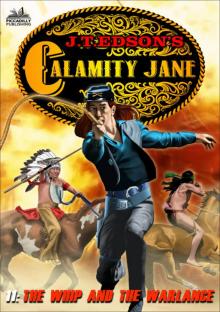 Calamity Jane 11
Calamity Jane 11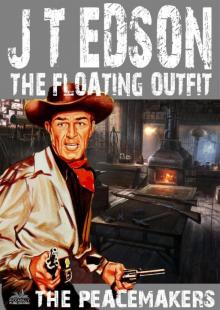 The Floating Outift 33
The Floating Outift 33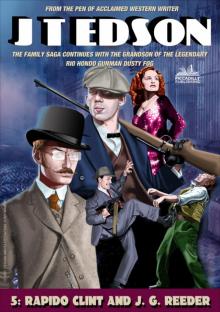 Cap Fog 5
Cap Fog 5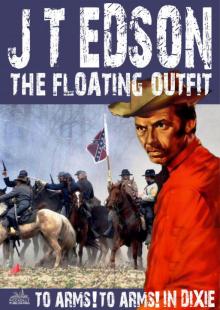 The Floating Outfit 34
The Floating Outfit 34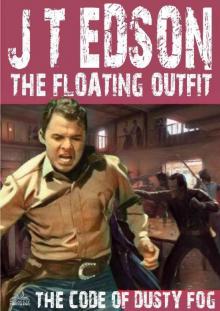 The Code of Dusty Fog
The Code of Dusty Fog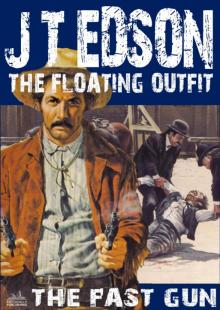 The Floating Outfit 21
The Floating Outfit 21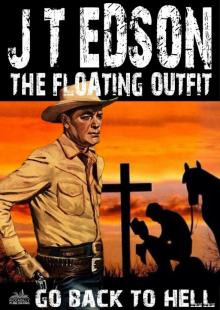 The Floating Outift 36
The Floating Outift 36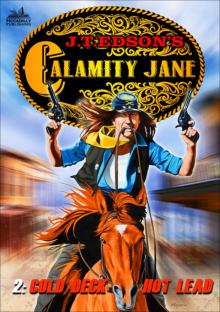 Calamity Jane 2
Calamity Jane 2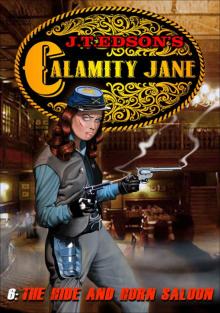 Calamity Jane 6: The Hide and Horn Saloon (A Calamity Jane Western)
Calamity Jane 6: The Hide and Horn Saloon (A Calamity Jane Western)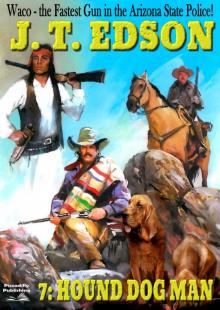 Waco 7
Waco 7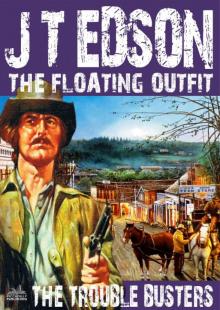 The Floating Outfit 25
The Floating Outfit 25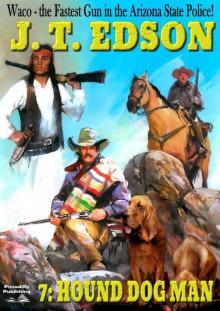 Waco 7: Hound Dog Man (A Waco Western)
Waco 7: Hound Dog Man (A Waco Western)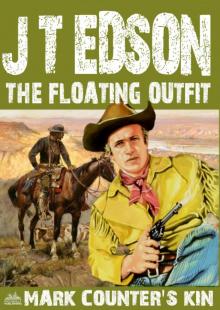 The Floating Outfit 47
The Floating Outfit 47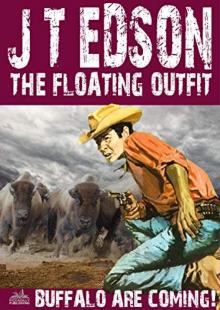 The Floating Outfit 42: Buffalo Are Coming!
The Floating Outfit 42: Buffalo Are Coming!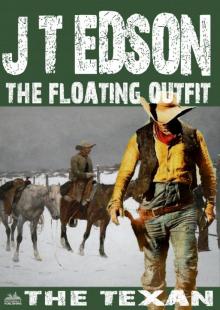 The Floating Outfit 46
The Floating Outfit 46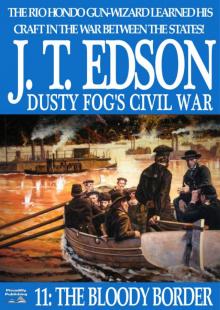 Dusty Fog's Civil War 11
Dusty Fog's Civil War 11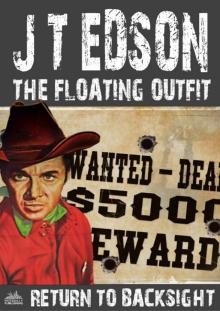 The Floating Outfit 61
The Floating Outfit 61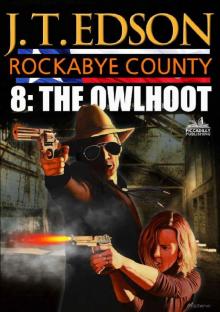 The Owlhoot
The Owlhoot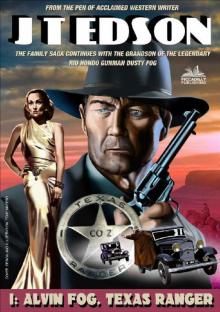 Alvin Fog, Texas Ranger
Alvin Fog, Texas Ranger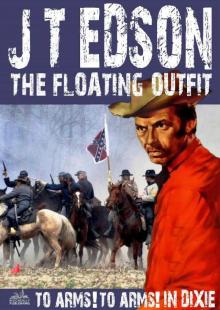 The Floating Outfit 34: To Arms! To Arms! In Dixie! (A Floating Outfit Western)
The Floating Outfit 34: To Arms! To Arms! In Dixie! (A Floating Outfit Western)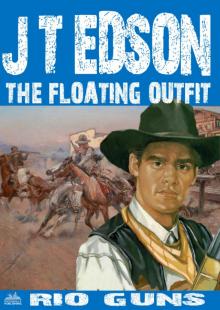 The Floating Outfit 44
The Floating Outfit 44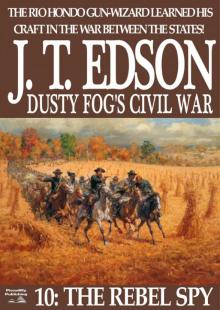 Dusty Fog's Civil War 10
Dusty Fog's Civil War 10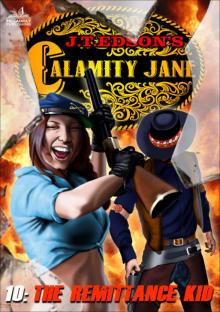 Calamity Jane 10
Calamity Jane 10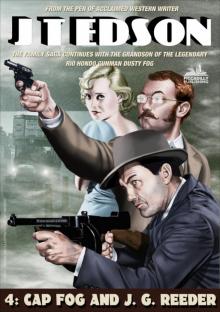 Cap Fog 4
Cap Fog 4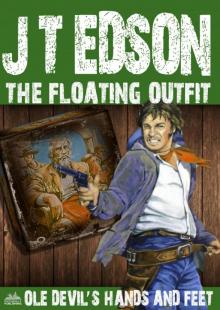 The Floating Outfit 51
The Floating Outfit 51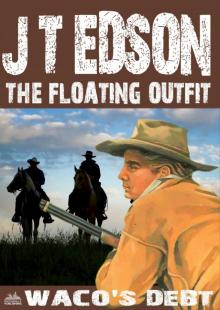 The Floating Outfit 50
The Floating Outfit 50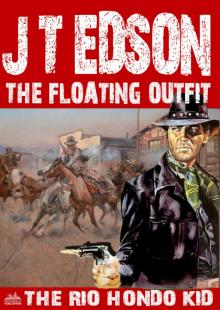 The Floating Outfit 49
The Floating Outfit 49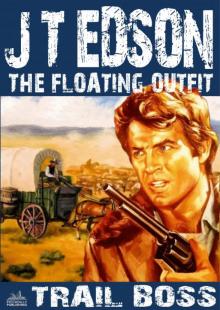 The Floating Outfit 10
The Floating Outfit 10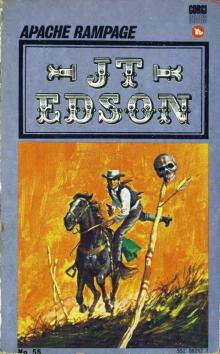 Apache Rampage
Apache Rampage The Floating Outfit 15
The Floating Outfit 15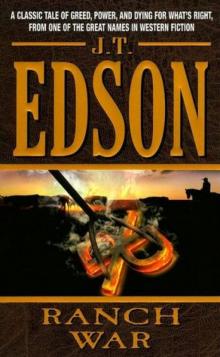 Ranch War
Ranch War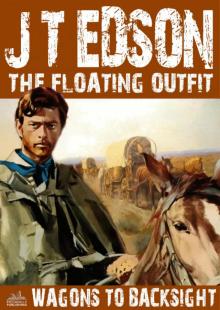 The Floating Outfit 11
The Floating Outfit 11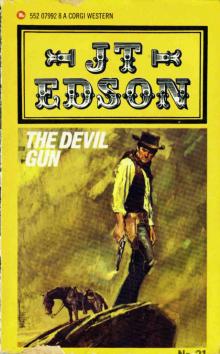 The Devil Gun
The Devil Gun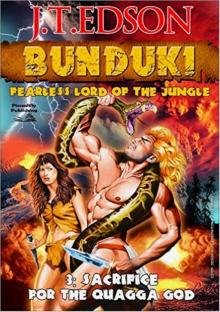 Sacrifice for the Quagga God (A Bunduki Jungle Adventure Book 3)
Sacrifice for the Quagga God (A Bunduki Jungle Adventure Book 3)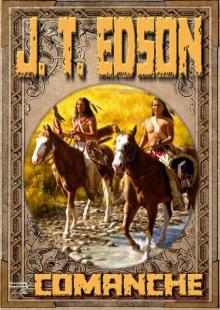 Comanche (A J.T. Edson Western Book 1)
Comanche (A J.T. Edson Western Book 1)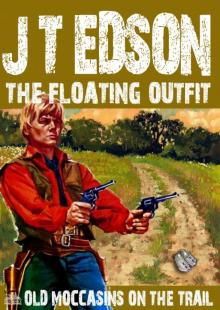 The Floating Outfit 48
The Floating Outfit 48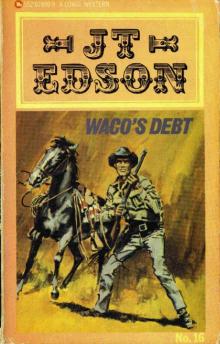 Wacos Debt
Wacos Debt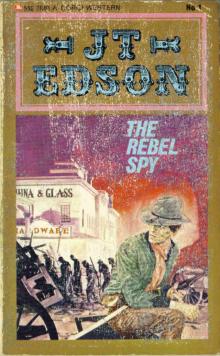 The Rebel Spy
The Rebel Spy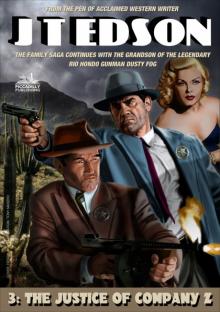 Cap Fog 3
Cap Fog 3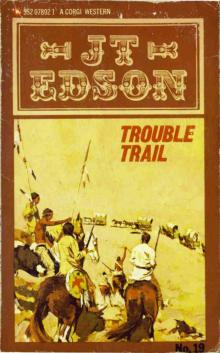 Trouble Trail
Trouble Trail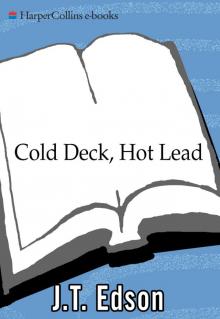 Cold Deck, Hot Lead
Cold Deck, Hot Lead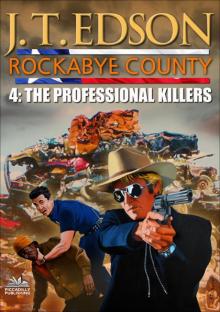 Rockabye County 4
Rockabye County 4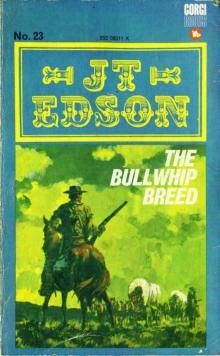 The Bullwhip Breed
The Bullwhip Breed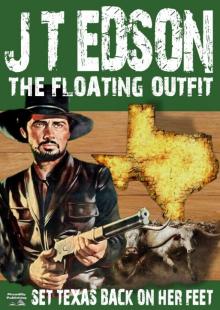 Set Texas Back On Her Feet (A Floating Outfit Western Book 6)
Set Texas Back On Her Feet (A Floating Outfit Western Book 6)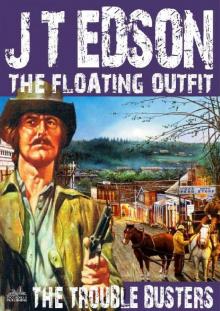 The Floating Outfit 25: The Trouble Busters (A Floating Outfit Western)
The Floating Outfit 25: The Trouble Busters (A Floating Outfit Western)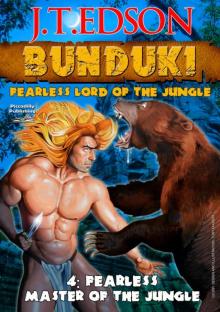 Fearless Master of the Jungle (A Bunduki Jungle Adventure
Fearless Master of the Jungle (A Bunduki Jungle Adventure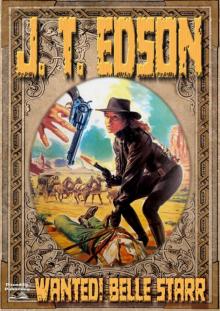 Wanted! Belle Starr!
Wanted! Belle Starr!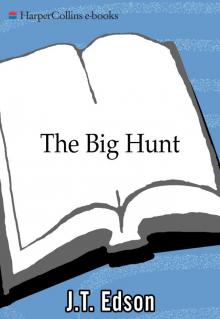 The Big Hunt
The Big Hunt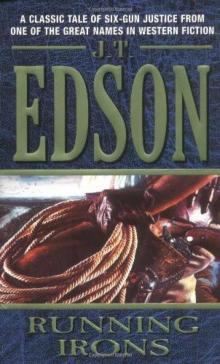 Running Irons
Running Irons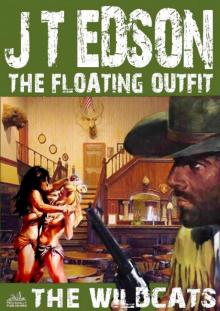 The Floating Outfit 19
The Floating Outfit 19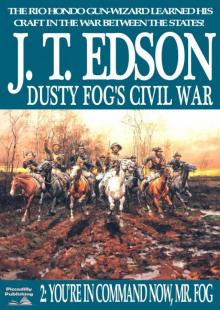 You're in Command Now, Mr Fog
You're in Command Now, Mr Fog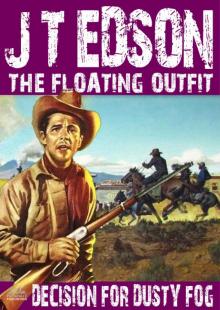 The Floating Outfit 27
The Floating Outfit 27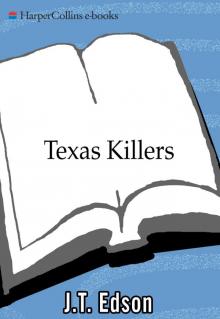 Texas Killers
Texas Killers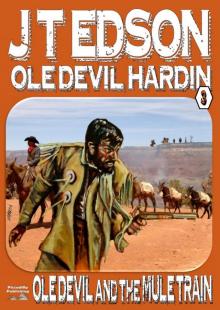 Ole Devil and the Mule Train (An Ole Devil Western Book 3)
Ole Devil and the Mule Train (An Ole Devil Western Book 3)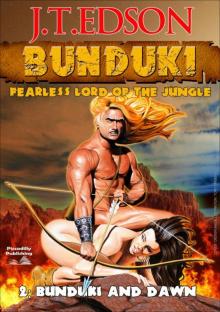 Bunduki and Dawn (A Bunduki Jungle Adventure Book 2)
Bunduki and Dawn (A Bunduki Jungle Adventure Book 2)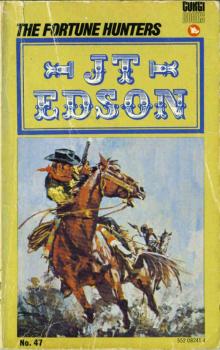 The Fortune Hunters
The Fortune Hunters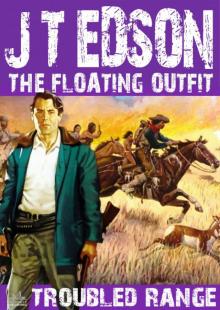 The Floating Outfit 12
The Floating Outfit 12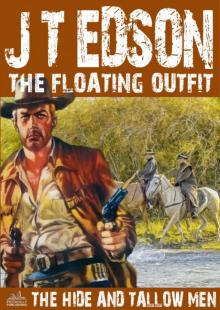 The Hide and Tallow Men (A Floating Outfit Western. Book 7)
The Hide and Tallow Men (A Floating Outfit Western. Book 7)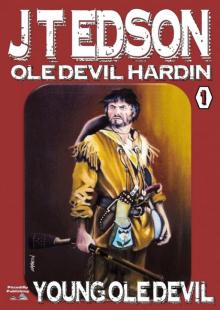 Young Ole Devil
Young Ole Devil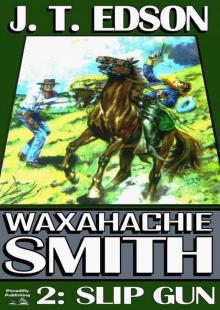 Slip Gun
Slip Gun The Drifter
The Drifter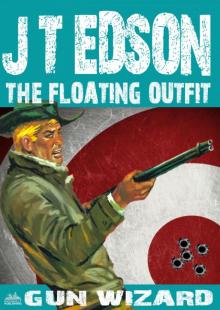 The Floating Outfit 45
The Floating Outfit 45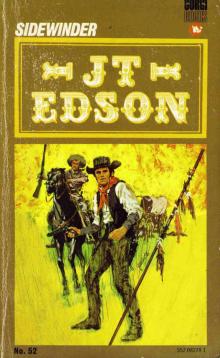 Sidewinder
Sidewinder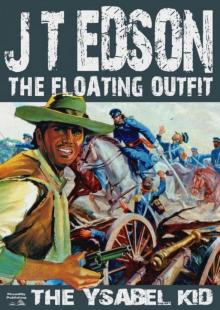 The Ysabel Kid
The Ysabel Kid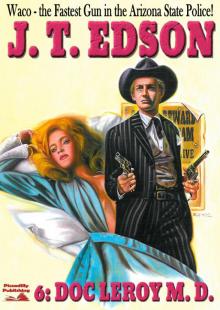 Waco 6
Waco 6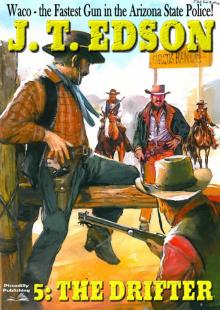 Waco 5
Waco 5 Point of Contact
Point of Contact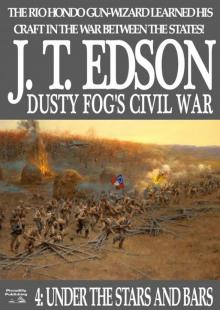 Under the Stars and Bars (A Dusty Fog Civil War Western Book 4)
Under the Stars and Bars (A Dusty Fog Civil War Western Book 4)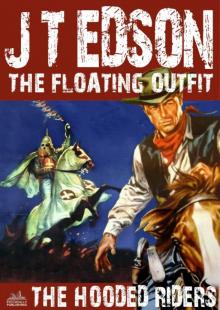 The Floating Outfit 9
The Floating Outfit 9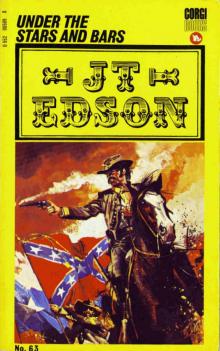 Under the Stars and Bars
Under the Stars and Bars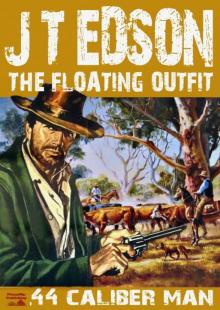 .44 Caliber Man
.44 Caliber Man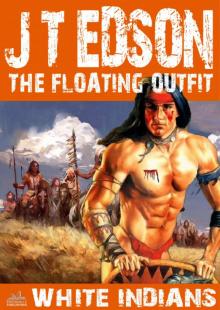 The Floating Outfit 17
The Floating Outfit 17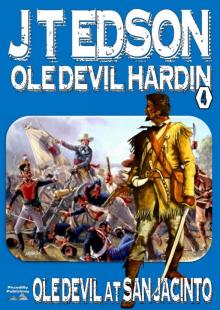 Ole Devil at San Jacinto (Old Devil Hardin Western Book 4)
Ole Devil at San Jacinto (Old Devil Hardin Western Book 4)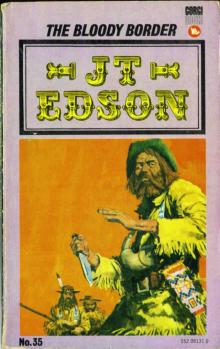 The Bloody Border
The Bloody Border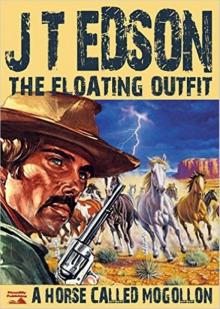 A Horse Called Mogollon (Floating Outfit Book 3)
A Horse Called Mogollon (Floating Outfit Book 3)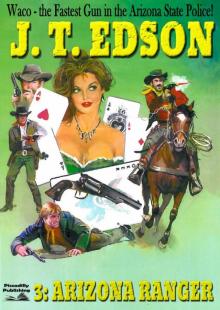 Waco 3
Waco 3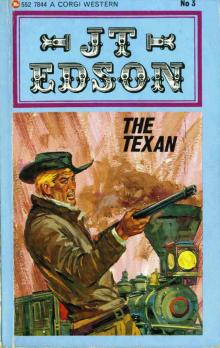 The Texan
The Texan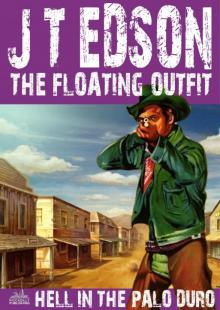 The Floating Outfit 35
The Floating Outfit 35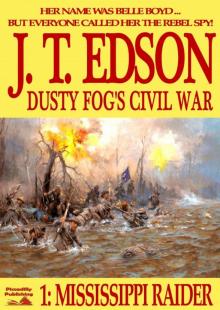 Mississippi Raider
Mississippi Raider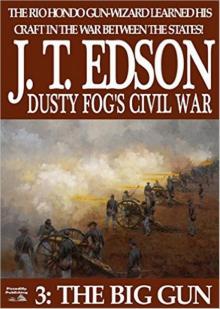 The Big Gun (Dusty Fog's Civil War Book 3)
The Big Gun (Dusty Fog's Civil War Book 3)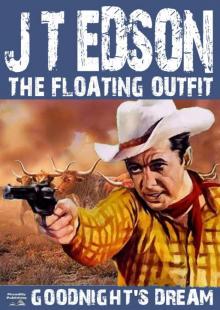 Goodnight's Dream (A Floating Outfit Western Book 4)
Goodnight's Dream (A Floating Outfit Western Book 4) Waco 4
Waco 4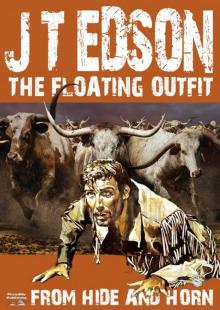 From Hide and Horn (A Floating Outfit Book Number 5)
From Hide and Horn (A Floating Outfit Book Number 5)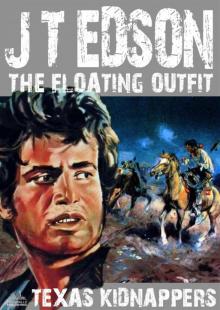 The Floating Outfit 18
The Floating Outfit 18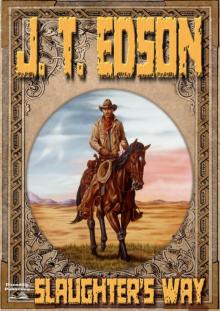 Slaughter's Way (A J.T. Edson Western)
Slaughter's Way (A J.T. Edson Western)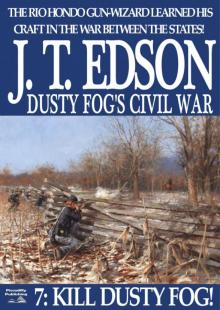 Dusty Fog's Civil War 7
Dusty Fog's Civil War 7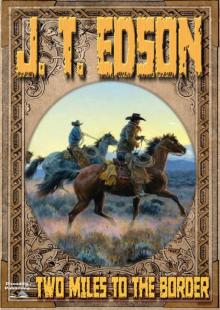 Two Miles to the Border (A J.T. Edson Western)
Two Miles to the Border (A J.T. Edson Western)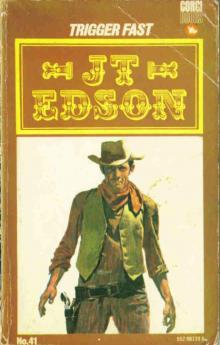 Trigger Fast
Trigger Fast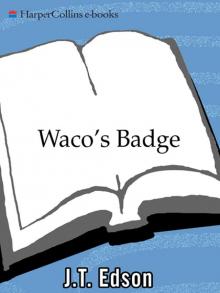 Waco's Badge
Waco's Badge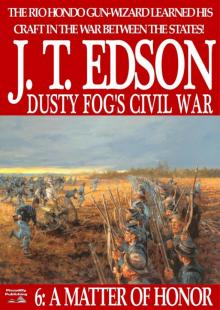 A Matter of Honor (Dusty Fog Civil War Book 6)
A Matter of Honor (Dusty Fog Civil War Book 6)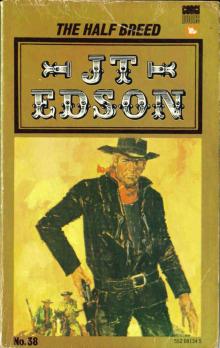 The Half Breed
The Half Breed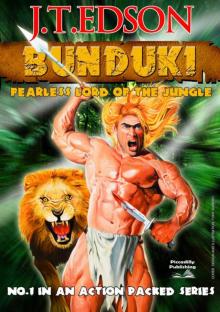 Bunduki (Bunduki Series Book One)
Bunduki (Bunduki Series Book One)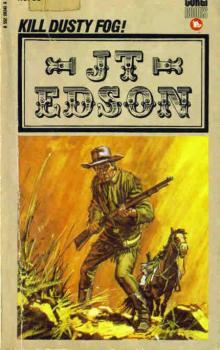 Kill Dusty Fog
Kill Dusty Fog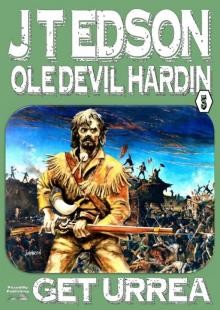 Get Urrea! (An Ole Devil Hardin Western Book 5)
Get Urrea! (An Ole Devil Hardin Western Book 5)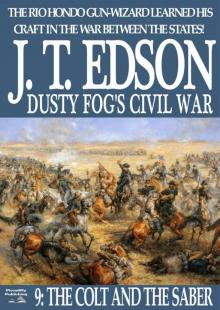 Dusty Fog's Civil War 9
Dusty Fog's Civil War 9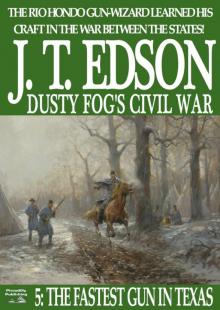 The Fastest Gun in Texas (A Dusty Fog Civil War Book 5)
The Fastest Gun in Texas (A Dusty Fog Civil War Book 5)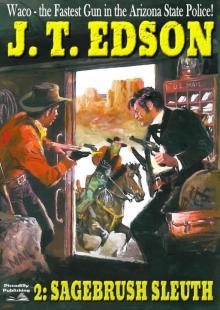 Sagebrush Sleuth (A Waco Western #2)
Sagebrush Sleuth (A Waco Western #2)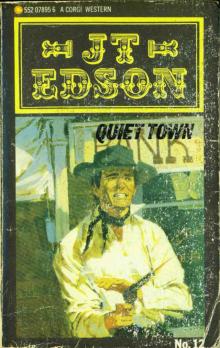 Quiet Town
Quiet Town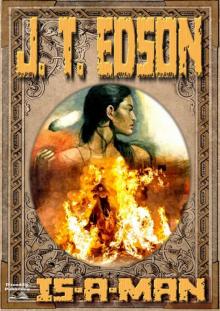 Is-A-Man (A J.T. Edson Standalone Western)
Is-A-Man (A J.T. Edson Standalone Western)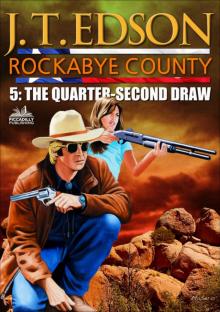 Rockabye County 5
Rockabye County 5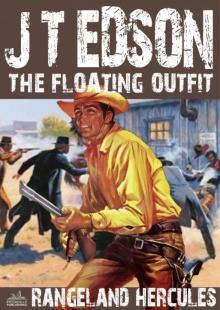 The Floating Outfit 14
The Floating Outfit 14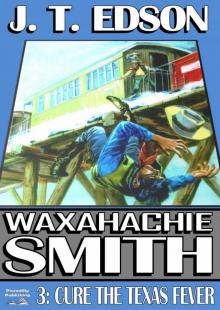 Cure the Texas Fever (A Waxahachie Smith Western--Book 3)
Cure the Texas Fever (A Waxahachie Smith Western--Book 3)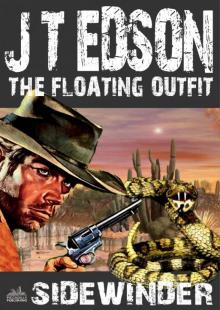 The Floating Outfit 13
The Floating Outfit 13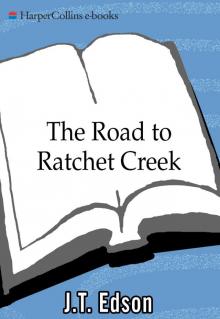 The Road to Ratchet Creek
The Road to Ratchet Creek